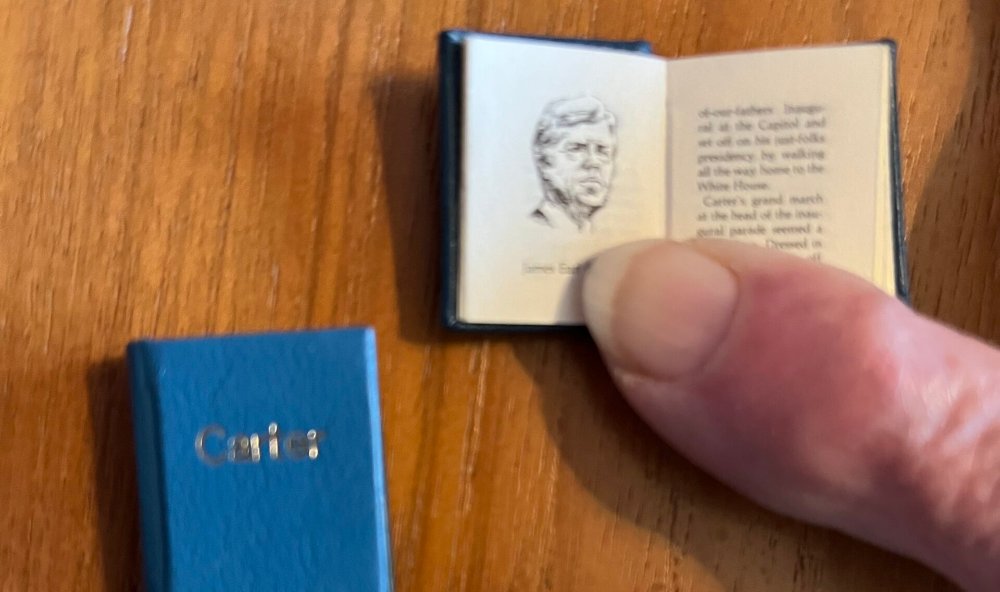During the runup to the 1980 presidential election, I wrote a book about President Jimmy Carter. It’s not a weighty volume. In fact it is almost weightless and measures barely 1” by 3/4th inch. I had been persuaded somewhat against my better judgment to write a Carter biography for a miniature book.
The story of why I wrote the book goes back to my childhood as a service brat. In ninth grade, I met and became friends with another peripatetic classmate, Miriam Owen. At the time, we had shared our childhood ambitions: I said I wanted to be a reporter. But Miriam had more of a loftier goal: she was aiming to be a book publisher.
Through growing-up years, we kept in touch, writing to one another. We occasionally connected, meeting in person when traveling cross-country. Fast forward and Miriam graduated from college, married a man named Kenneth Irvin and was living in Cincinnati Ohio, where the couple founded Mosaic Press. Mosaic made a specialty of producing miniature books. The tiny volumes were perfectly readable by squinting or with help from a magnifying glass. The mini-tomes were novelty items designed to be shelved in a dollhouse-sized bookcases by collectors and hobbyists.
Although Miriam and I were now living thousands of miles apart, we had continued to correspond at Christmastime. On a couple of occasions, she wrote about her publishing enterprise, urging me to write something for Mosaic Press.
By that time, I was gainfully employed at a daily newspaper. I responded to her request, asking, “Why in the world would I do that?”
“Well, we do pay $50,” she wrote. “Besides the author gets 12 copies of the book. And more than that: No one ever — not ever — throws away a miniature book. It’s instant immortality.”
The pay certainly wasn’t tempting but the idea was just crazy enough to be intriguing. It also presented an interesting challenge: The need to plan on a limited number of words to a line and on fitting 12 lines onto a page. So I wrote a miniature book of recipes. Given those restrictions, recipes had to be short. I limited each one to three or four ingredients and titled my book, “Hasty Put-ins.”
What came back later was my bonus check and 12 books, nicely bound but little better than thumbnail in size. The tomes were something unusual that I would hand out to random children and as a curio for that relative who didn’t need or want “stuff.”
A year or so after that first experience, Miriam wrote to say that she wanted to publish biographies of the two men running in the 1980 presidential election. She asked if would sign on to write the book for President Jimmy Carter. After much discussion, I finally agreed. Miriam had promised the finished volumes would be elegantly bound and readied in time for the election.
It wasn’t difficult writing the Carter biography, not after so much had been written about of the 39th president’s life story. Carter had an amazing background — rising from a Georgia farm boy to an Annapolis graduate and Naval officer through his return to the family farm to grow peanuts and cotton, followed by his election to the Georgia Senate and on to becoming state governor.
Carter surprised the political pros by winning caucuses in Iowa and then going on to defeat incumbent President Gerald Ford. During his first term, Carter had forged some admirable accomplishments in international diplomacy, world health, welfare reform, and the environment. But the final years of his term had been badly marred by the stalled Salt II Treaty, stubborn inflation, gas shortages, Soviet invasion of Afghanistan, and the Iranian hostage crisis.

When the twin Carter/Reagan books came off the press prior to their 1980 matchup, it was obvious the tiny books been handsomely done: azure blue leather covers, marbled end papers and gilded pages. Each edition included a chapter “about the author,” and each volume had been hand-numbered. I now possessed Carter: The Will to Win, volume 2. Miriam had also sent me Reagan: The Man From Main Street, number 51.
I don’t know how many copies of each miniature book had been printed, although there probably were a few hundred since I’d been sent one numbered 324. But I did know that Miriam had worked hard on distribution. She reported that, because the Russians treasured little books, there were now copies of the biographies shelved in the National Library of Russia in St. Petersburg.
Whether that claim is still true, I can’t say, not having checked on Russia’s national library. But I have to say that, after rereading the Carter copy that had all but been forgotten on my crammed bookshelves, I was relieved to find that my text had held up. At least, I needn’t be apologetic at taking part in a long-ago stunt. Those Carter and Reagan miniatures are still listed on the Mosaic Press catalog. Sadly, I can’t offer belated thanks to my publisher, Miriam Owen Irwin, who died in 2021 leaving her husband Kenneth Irwin to carry on.
Meanwhile, as this nation knows, Jimmy Carter was defeated for a second term in 1980, leaving his ill-fated presidency. However, he went on to become a much revered and beloved ex-president, monitoring elections, promoting democracy, and building thousands of Habitats for Humanity. Living into his 100th year, Carter set an unsurpassed example not only to his peers, but to any who strives to live a life in service to others.
Discover more from Post Alley
Subscribe to get the latest posts sent to your email.

This is a lovely story, and a really beautiful book. “No one ever — not ever — throws away a miniature book.” Probably true because it’s so much easier to lose it.
I wish I had known when I was in St. Petersburg, Russia, some years ago to check the library for your opus.
Do these miniature books get LOC numbers etc?